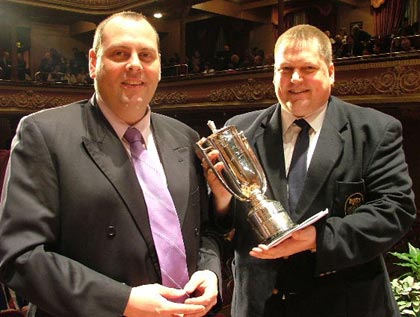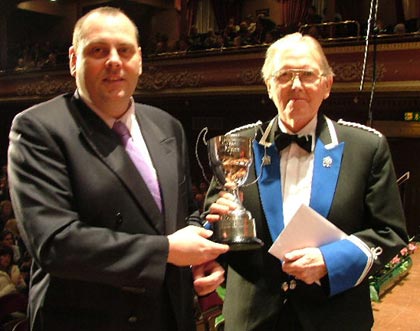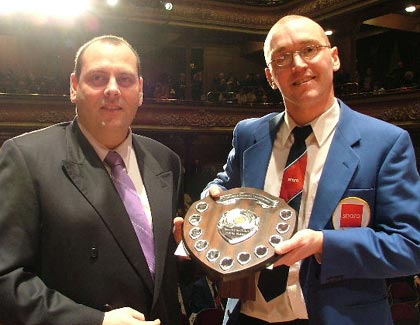2005 Regionals: Yorkshire - Retrospective: Second Section
11-Mar-2005It was strictly peering through the gaps in your fingers at the carnage that was wrecked on a VW here, but Hebden Bridge came through just about unscathed to claim the title.
For those of you out there with fairly weak stomachs and liberal tendencies, please look away now.
The Second Section contest here in Yorkshire was the musical equivalent of a motorway car crash. Thankfully there was no need for the body bags and helicopter flights to A&E, but my word, it was just as gruesome at times.
It would however be difficult to put the blame for this squarely at the door of the drivers – the MDs and their bands. No. They were allowed to take their vehicles onto a stretch of road that was totally unfit for the purpose of testing their ability to navigate with safety and style, by the people who chose ‘Variations for Brass Band' as the test piece for the Second Section. This was like asking a motorist with two years experience to try and drive up the M6 motorway in dense fog, no headlights, two bald tyres and twitchy steering.
There were times here when it was difficult to take your eyes and ears away from the carnage that was displayed in front of you. Musical rubber necking could well be the term to describe it, but it was as a result not of the poor quality of the bands, but of the poor quality of the choice of the test piece. The bands just didn't stand a chance.
The winners, and deservedly so, were Hebden Bridge conducted by the experienced Ian Craddock, and whilst they should be congratulated for their efforts in trying to master such a work, in all honesty theirs was the least worst of the 10 performances displayed for the two adjudicators, Duncan Beckley and John Roberts.
John himself gave a very restrained and professional set of oral remarks at the end of the contest, which just about summed up the difficulties that the bands had encountered. "The quality of band sound wasn't here today," he said. "There was a lot of overblowing, especially from one band, whilst several bands played wrong notes that were in fact published on an errata which was published on 4BR. It is a stern musical and technical test, and whilst the winners were good, even they had problems. Further down the list those problems were increased."
John was being respectfully diplomatic but he further put the playing into context with his initial remarks. "This piece was used as the Championship Section test piece in 1979 and by no means could the very best bands play this piece then – the Adagio needs to be ethereal in quality for instance. This is great music – not perhaps the greatest of the banding repertoire, but in the top 10 – 12. The standard today showed that it is still a very difficult work to master."
Speaking later, together with the other judge, Duncan Beckley back stage, both stated that they were disappointed with the overall standard, but felt that it was because simply the piece was far too difficult for bands at this level. They both had nothing but the greatest respect for the efforts displayed by all the bands, but as they both knew (both had played and conducted winning performances on the piece on the past at a higher level) it was simply a piece that had too many musical and technical problems that could be successfully overcome here.
That was very clear from the first to the last performance here – none came out of it unscathed, and whilst some, like Hebden suffered just a few nasty scratches on the musical bumpers, others had headlong smashes. No fatalities, but plenty in need of lengthy periods recuperation and confidence building.

Hebden Bridge: 1st place
It didn't take away the joy though for Hebden Bridge and the other qualifiers for the Finals in Harrogate, West Yorkshire Police, especially with the knowledge that come September they will surely not be faced with such a severe test as this again.
"We are delighted to have won," said Steve Gardner of Hebden Bridge when he spoke to 4BR after collecting the British Bandsman Challenge Cup and the £200 top prize. "We have worked so hard for this, with any number of sectional rehearsals, mixed rehearsals and individual practice. Ian Craddock knew this was such a very difficult piece, and we therefore worked even harder to make sure we came and produced a good show on it. It was exceptionally hard, but Ian really knows his stuff and it paid off. We can now relax and look forward to the Finals."
You could sense the solo cornet player's relief at knowing that perhaps one of the hardest tests in his bands history had been overcome well and that they could now look forward to the Finals.
That they were on their way to Harrogate was in no small part to the fact that Ian Craddock had directed a very sensible and no frills approach to the work that played as much as it could to the strengths of his band. They didn't overblow, and the MD was one of the few on the day to make the marked differences between each variation. In the end it produced a workmanlike account, full of neat individual efforts (the soprano player, Colleen Smail was excellent and fully deserved her soloist prize) and which had much to commend in the warm ensemble sound they produced. Nothing spectacularly good, but the best by a good margin on the day, and perhaps the only one to really just about master the piece.
Behind them, it wasn't as good.
The failure of many of the MDs to recognise the differences in styles between each of the eleven variations was disappointing to say the least, whilst dynamic and tempo variations were almost negligible in far too many performances.
Why for instance did many play the final fugato (Var 10) at a speed that was in most cases almost 50% up from the opening that was marked exactly the same? Also, bar six of the piece was only successfully played by two bands all day (including the winners) – a simple crotchet tied to two triplet quavers which sounded throughout the piece as a crotchet tied to two semi quavers. Many played the Valse at a tempo Torvill and Dean would have been hard pressed to skate too, whilst the alla polacca was once more played time and time again without any sense of Polonaise style.
It is hard to blame the players, but not so hard to blame the MDs for this, as this was basic stuff, but it is all symptomatic of a choice of work that was too difficult for players and conductors alike to make proper sense of. You just watched and listened time and after time as the bands simply careered out of control into a messy collision of overblowing, split notes and wrong notes, poor entries, over accentuated production and poor ensemble balance. It was X rated stuff.

West Yorkshire Police: 2nd place
West Yorkshire Police were about the best of the rest – it was steady and solid enough and the tempos meant that it lack flow at times, but it was perhaps the cleanest of the performances behind Hebden Bridge and Barry Thompson did have control and understanding of the differing styles required in the variations, whilst the set up of having the cornets each side of the band did give the fugue sections a better balance.
The one performance that did make a mark, but perhaps for the wrong reason came from Elland Silver under Morgan Griffiths. It was a strange account this – full of confidence, but also full of overblowing (the one the judges mentioned). All the technical challenges were just about in place, but the style was some 45 years further forward than the piece itself. It was a thoroughly modern approach – but one which was perhaps out of context. A lesson learnt for all concerned.

Strata Brass: 3rd place
Strata Brass under Kevin Wadsworth came in third and as the judges remarked, were close to coming runners up. Perhaps that was so, but overall this too was a performance that didn't really come up to the mark, although a decent opening (they were the other band to play bar 6 correct) promised much. The further it went on though the more the errors crept in and the standard fell away, and whilst the final fugue and chorale were well paced, it finished somewhat untidily.
After that it became a bit of a triage system of putting the least musically hurt and injured ahead of the rest.
Wetherby and District under Glyn Kearsley had their moments with a good quality soprano player on good form throughout, but there was too much harshness in the band sound and the error count was very high. Meanwhile South Yorkshire Police under Andrew Dennis also had a few really decent moments, but had a strident sound that spoilt the good work going on in the lower end of the band and it petered out somewhat at the end when a huge rallentando was put in place where it wasn't needed or marked.
They were not the only band to do this, and Meltham and Meltham Mills were another to fall into this trap at the end of the piece. Stuart Fawcett had tried to make the most of his resources on offer, but once more the execution couldn't match his direction and it fell away in the final movements.
That left a bottom four of Rockingham, Stanley Newmarket, Frickley/South Elmshall and Elland.
Each found the piece tough going, with Rockingham under Peter Kitson never quite recovering from a poor start and lacking a depth of sound, whilst Stanley Newmarket played with the bass section sat where the trombones usually reside. This gave them an imbalanced sound in the louder sections and made for a slightly harsh sound too often to please the ears of the judges.
Finally, Frickley/South Elmshall who were directed in eccentric fashion by Bob Morton. The playing was variable, with mispitching and the percussion seemingly our of sync too often, but the surprising thing for us was that the MD decided to conduct a quarter of the piece with the baton clasped between his teeth as if he was trying to offset the pain of what was going on by biting the bullet so to speak.
Strange isn't the word for it, and it rather summed up all that was going on.
Hebden Bridge will head for the Finals in good heart after overcoming perhaps the hardest test piece they will come across in the Second Section. West Yorkshire Police will join them as well, and they will both prove to be strong contenders given pieces they can play without so much discomfort.
As we have said. This was not a pretty sight, but thankfully it is all over now, and there were no fatalities to report. Contesting can be a gruesome business at times.
Iwan Fox















